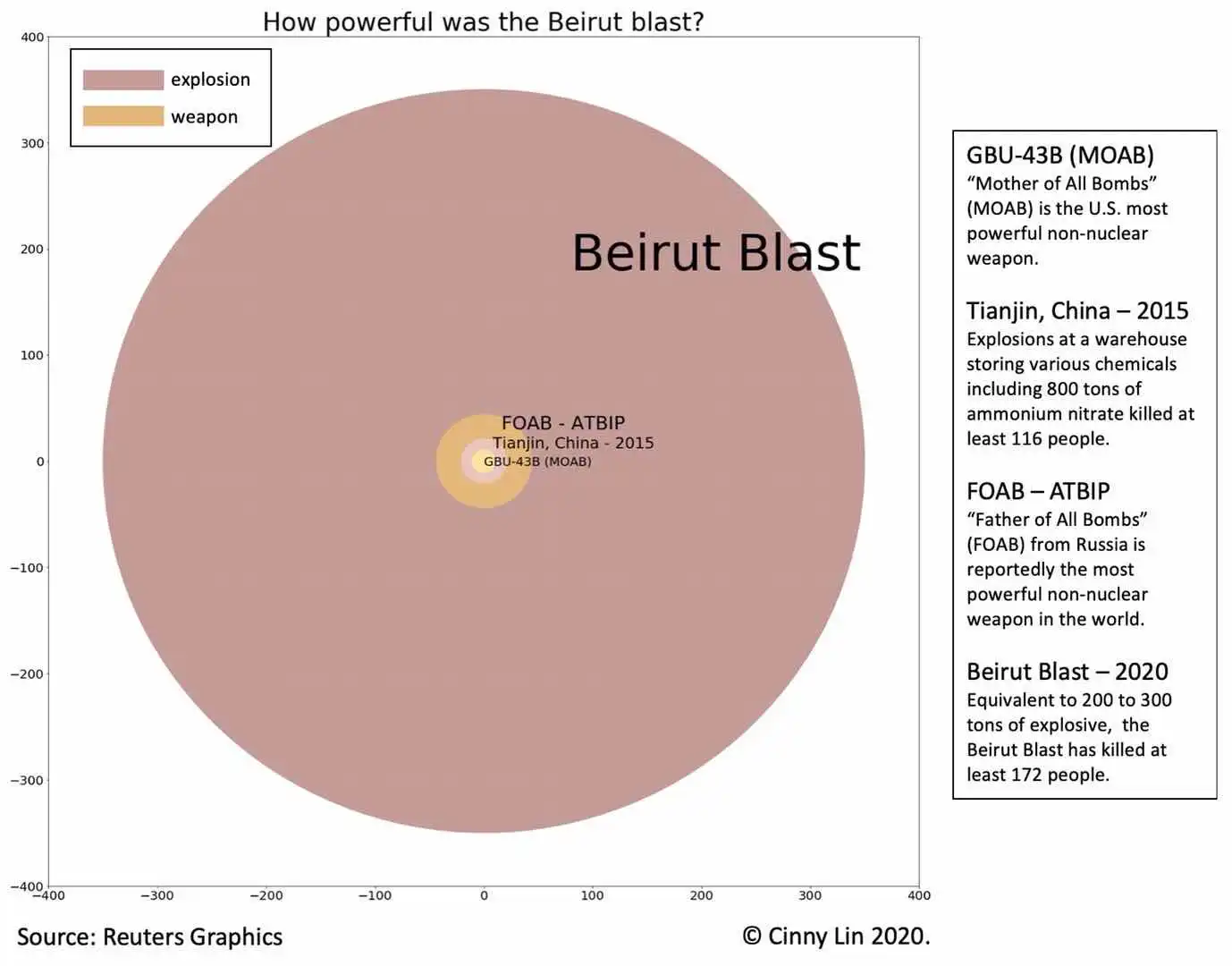Beirut: The Aftermath
The future of the Lebanese government remains unknown as minister after minister resigned following the blast along with protests for government reform. Could the aftershocks of Beirut be more impactful than the explosion itself throughout Lebanon?
Current death tolls from the BBC and al-Marsad Online number at 220 and the number of missing at 110; as many as 300,000 were left homeless after the explosion with “main water and electricity stations hav[ing] been heavily damaged.” Lebanon had already been facing economic instability before the blast, with humanitarian aid organizations along with the UN warning of a crisis unless more medical and food supplies were issued. French President Emmanuel Macron hosted a virtual summit on August 9 to gather $297 million in international donor support that was to be delivered “directly to the Lebanese population” according to an official Élysée article from the French government.

The true question is how Lebanon will handle matters after the dust clears. Currently, there are 1.5 million Syrian and Palestinian refugees who have fled from regional conflicts such as the ongoing Syrian Civil War since 2011 and various military encounters between Palestinians and Israelis. The Beirut port, the largest in Lebanon, remains in ruins after the explosion and stresses the importance of finding new methods of entry for humanitarian supplies to channel in. Tripoli, the second largest city in Lebanon, remains the best alternative for freights and ships to supply aid, despite having only one-third the capacity of Beirut.
https://lh6.googleusercontent.com/hsjmsPEKu1XKlOOksHjgY-yt1xDL_gK8DynrQKXyP0_jwXNVd248O5qhQ4HO0DlGw0Cu195TpjMWnmh5WL4brrnN1NhdDexFS7SkiskD5qY2cQOUlsniT4q4HpyESOD0R5QwphJO
https://lh5.googleusercontent.com/W6oB7mr9BjbABfpkx0hhsA1TCiOyhVPS5e-arrEuTJhsSGWn1F0Yc08fiq6CQmKLoFQNpxEZh2L5Lyy77Yc8gz2ie7OVJbfGstppoaoByy83KLFhGU9aOUGc5lNCxHHByFqb4WLW
Source: https://legacy.lib.utexas.edu/maps/lebanon.html
Lebanon’s government is based around a confessionalist system: a combination of religion and political governance that divides the population into different groups, or sects, based on religion with political relevance. The three main religious groups that make up Lebanon (in order of official majority) are Maronite Christians, Sunni Muslims, and Shi’a Muslims. Executive branch chairs are constitutionally bound to these three religions which require the president to be a Maronite, the prime minister a Sunni, and the Speaker of Parliament a Shi’a. The seats were given based on proportional representation of a 1932 census that determined Maronite Christians were the majority of the population. The last official government census was in 1932, with the current and all prior administrations refusing another.
https://lh3.googleusercontent.com/WCERMmcDr1IYR_4CTm5UmvRIPAO5oxFSZo4mxx0c1G_RfvHeArnypDhnJ1fKA-LftRLE7zoUV0gNZYmCFHYVbFEZbwRR9KW10ZOh5VSzg6yURoxTNpRJu1wxSBNo6kCy2TuEHb3Z
https://lh4.googleusercontent.com/Jud3C53K9fTxnaqNII1aHdYeQS4fPMLjPOoaixAOqfHaozBTitUpbz1NGGyNllPo4001mKzq1cbVGoGcUBpMZoVkFXaI7-rmD_8AP6jUHMAAiSBekdzs3x9MDtvLHo0pz4EMZmdT
As of Monday August 10, Prime Minister Hassan Diab and his entire cabinet resigned due to mass protests against the current administration. This leaves the government’s power limited to day-to-day operations as opposed to passing non-urgent legislation or organizing any political reform. Humanitarian aid can now enter Lebanon without pushback from the government to help relieve the effects of the explosion along with the low functioning economy.
President and CEO of the humanitarian group Anera, Sean Caroll, states that he wishes to “take advantage of any relaxation of some of the restrictions” on aid imports. The Trump administration, however, would provide aid through the UN based on past US administrations but now distrusts the humanitarian organization. American aid has amounted to $2 million through bilateral donations unaffiliated with the UN. This may also be in part due to the Trump administration’s distaste for Diab’s government in Lebanon. In contrast, Canada has already donated $30 million in response to the Beirut explosion in addition to the $3.5 billion donation plan on-going from 2016-2021. The French currently provide the most aid at $297 million; French and Lebanese historical ties run deep in both countries, and that is evident today.
France originally occupied Lebanon after World War I when the Middle East was divided amongst Western powers. As such, the French administration’s support for Lebanon runs deep in their history but has resulted in one notable side-effect. Macron wishes to provide humanitarian relief to the country but refuses to pressure governmental reforms as they did during colonialism. The French president stated at the end of his Beirut visit that he would “not craft a political solution for Lebanon and that it was up to the Lebanese to construct it” according to a Foreign Policy article.
The nationalist group Hizballah, however, has gained the support of the majority in Lebanon for decades. Hizballah is a Shi’a Muslim-affiliated group that was founded during the Lebanese Civil War from 1975-1990. As Lebanon had been affected by Western powers after World War I and absorbing thousands of Palestinian refugees, a nationalist surge had been boiling amidst constant international and domestic conflict. A 1985 manifesto states their goals being to expel Western influence from Lebanon, eliminate the Israeli state, and pledge allegiance to Iran’s supreme leader (Iran is majority Shi’a Muslim). Since 1992, Hizballah have gained a large enough following to claim seats in Lebanese parliament and still maintain a strong political presence. The Lebanese population consists of different religious sects, nationalist group affiliations, and identities when it comes to forming the nation’s administration.
The Beirut explosion has created a turning point in Lebanese politics that will inevitably require a solution from the Lebanese population as opposed to foreign governments. With the nationalist group Hizballah gaining the majority of approval amongst the Lebanese, is it likely that the Hizballah will form their own independent government? In May 2008, a national unity government was formed amidst constant gridlock and political upheaval between the Lebanese government and Hizballah. Hizballah effectively took control of the entire government with their Sunni and Syrian supporters into the modern day. If the French endorse a Lebanese-molded government, will Hizballah or other organizations take control again?
Lebanon is in dire need of more aid relief and political guidance as it faces a political, economic, and humanitarian crisis. How might the Lebanese government reform itself to be sustainable, effective, and representative of the population in the future?
This article was written byDeclan MazurandCinny Lin,currently based in Massachusetts and Taipei. You can reach out to the authors at djm752@nyu.edu/ycl461@nyu.edu.
Photo Credit: AFP / Getty